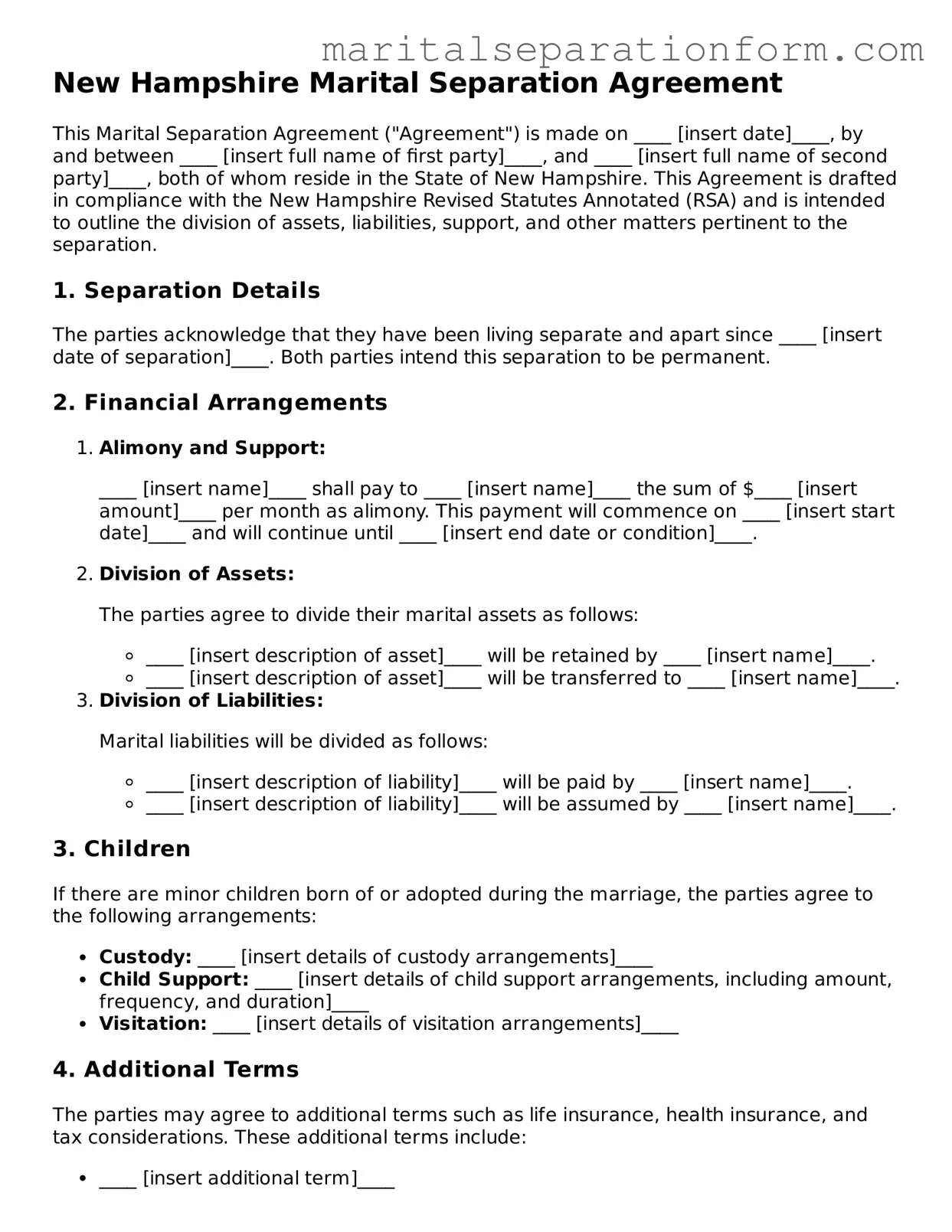What is a New Hampshire Marital Separation Agreement?
A New Hampshire Marital Separation Agreement is a legally binding document that outlines the terms by which a married couple agrees to live separately. It addresses issues such as asset division, debt allocation, child custody, visitation rights, and spousal and child support. The purpose of this document is to make the separation process more manageable and to protect the rights and responsibilities of each party.
Do I need a lawyer to create a Marital Separation Agreement in New Hampshire?
While it's not mandatory to have a lawyer to create a Marital Separation Agreement in New Hampshire, obtaining legal advice is highly advisable. Lawyers can provide critical insights into your rights and obligations under state law and help ensure that the agreement fairly represents your interests. Having a lawyer review the agreement can also prevent legal issues or misunderstandings in the future.
Can a Marital Separation Agreement be modified?
Yes, a Marital Separation Agreement in New Hampshire can be modified, but both parties must agree to any changes. The modification process often involves drafting a new agreement that outlines the adjustments or directly amending the existing agreement. These modifications must then be filed with the court. In cases involving children, the court will review the changes to ensure they meet the children's best interests.
Is a Marital Separation Agreement the same as a divorce in New Hampshire?
No, a Marital Separation Agreement is not the same as a divorce in New Hampshire. A separation agreement allows a couple to live apart and make legally binding arrangements regarding their finances, children, and property, but they remain legally married. A divorce legally ends the marriage. Couples often use a separation agreement as a step toward divorce, detailing their arrangements before finalizing their divorce.
How is child custody determined in a New Hampshire Marital Separation Agreement?
In New Hampshire, child custody arrangements included in a Marital Separation Agreement must be based on the child's best interests. Earning the agreement of both parental figures, considerations might encompass the child’s age, health, relationship with each parent, the child's educational needs, and the parents' ability to provide care. Courts retain the authority to modify these arrangements if they believe the agreement does not adequately serve the child’s best interests.
What happens to our shared property and debts in the separation agreement?
In the agreement, shared property and debts must be divided between the spouses. This division is based on what is deemed fair and equitable, considering each party's contributions, the value of the assets, and each party's needs. Debts are similarly divided, with responsibility for payment allocated to one or both parties. Detailed documentation and clear agreements can prevent future disputes over property and debt division.
Do we need to file the Marital Separation Agreement with a court in New Hampshire?
Yes, for a Marital Separation Agreement in New Hampshire to be legally enforceable, it must be filed with the court. Filing the agreement allows it to be recognized legally and, if necessary, enables either party to request court assistance to enforce the terms of the agreement. The process involves submitting the completed agreement to the court for review and approval.
What if we reconcile after creating a Marital Separation Agreement?
If a couple reconciles after creating a Marital Separation Agreement in New Hampshire, they can choose to void the agreement. Voiding the agreement usually involves drafting a new document stating that both parties wish to nullify the terms of the separation agreement and submitting it to the court. It's important to legally document reconciliation to ensure that the separation agreement is no longer enforceable.

